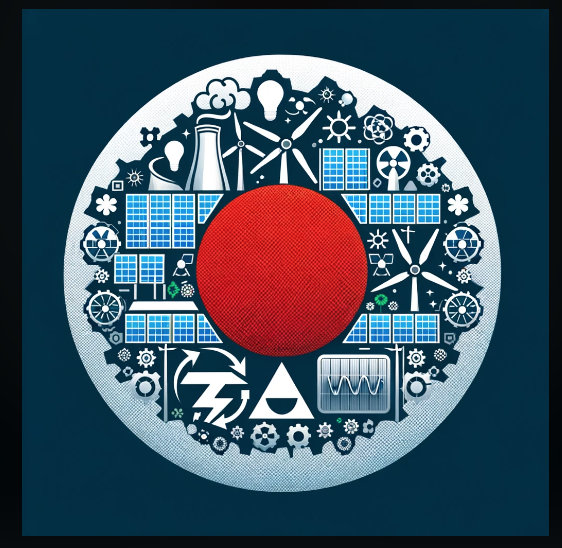Overview
Japan stands as a significant player in the global energy market, primarily due to its scarce natural resources, which has shaped its approach to energy consumption, production, and policy. As an island nation with limited domestic energy resources, Japan heavily relies on imports to meet its energy needs. It is one of the world’s largest consumers of oil, natural gas, and coal, and has been a leading adopter of nuclear energy, although the 2011 Fukushima Daiichi nuclear disaster has since influenced its nuclear energy policies. In response to its energy challenges and global environmental commitments, Japan has been aggressively pursuing renewable energy sources and energy efficiency improvements.
Institutions and Energy Policy
Japan’s energy policy is governed by the Ministry of Economy, Trade and Industry (METI), which oversees energy production, consumption, and the implementation of energy policies. The Strategic Energy Plan, periodically revised, guides Japan’s energy policy framework, focusing on energy security, economic efficiency, and environmental sustainability. The country has also been working on diversifying its energy sources, reducing greenhouse gas emissions, and increasing the share of renewable energy in its energy mix as part of its commitment to the Paris Agreement.
Energy Companies
- Oil and Gas: Japan’s oil and gas sector is dominated by a few major players, including JX Nippon Oil & Energy Corporation and Inpex Corporation, which engage in the exploration, production, and sale of oil and natural gas.
- Power Sector: The Tokyo Electric Power Company (TEPCO) and Kansai Electric Power Co. are among the largest electric utilities, providing electricity generated from various sources, including nuclear, thermal, and hydroelectric power.
- Renewable Energy: Companies like SoftBank Group Corp., through its SB Energy subsidiary, are significant players in the renewable sector, focusing on solar and wind energy projects. Japan is also advancing in offshore wind projects and hydrogen fuel technology, with companies like Mitsubishi Heavy Industries and Toshiba involved in these areas.
Energy Supply
Japan’s energy supply is diversified across several sources. The country is a major importer of liquefied natural gas (LNG), coal, and oil to meet its energy needs. Post-Fukushima, Japan has reduced its reliance on nuclear power, which has led to an increased dependence on fossil fuels and a greater interest in renewable energy sources. Solar, wind, hydro, and geothermal power are expanding segments, with solar energy experiencing the most significant growth in recent years.
Energy Prices
Energy prices in Japan are among the highest globally, largely due to the costs associated with importing almost all its fossil fuel requirements and the need for energy security. Electricity prices are also significantly affected by the mix of energy sources, including the expensive process of maintaining and constructing nuclear plants and the increasing share of renewables.
Energy Consumption
The industrial sector is the largest consumer of energy in Japan, followed by the residential and commercial sectors. Energy efficiency has been a key focus, with Japan being one of the leading countries in developing and implementing energy-saving technologies and practices. The government has implemented various measures to reduce energy consumption across all sectors, promoting the use of energy-efficient appliances, vehicles, and industrial processes.
Issues and Prospects
Japan faces several challenges, including an aging population, the need for energy security, and the transition to a low-carbon economy. The country is exploring innovative energy technologies, such as hydrogen fuel cells and energy storage, to overcome these challenges. Japan’s commitment to reducing its carbon footprint and enhancing its renewable energy capacity is evident in its strategic energy plans, which include ambitious targets for renewable energy adoption and carbon emission reductions by 2030 and beyond.
The future of Japan’s energy sector appears to be leaning towards a more sustainable and diversified energy mix, emphasizing renewable energy, energy efficiency, and the potential revival of nuclear energy with stricter safety measures. The ongoing global shift towards cleaner energy sources presents both challenges and opportunities for Japan, particularly in technology development, energy policy, and international energy cooperation.
Recent Developments
Japan is undergoing significant developments in its energy policy and strategy, focusing on the 2024 review of the Strategic Energy Plan with an eye toward the 2035 targets and beyond. The review aims to address Japan’s energy mix in the context of evolving energy landscapes, such as the potential growth in power demand from the IT sector, and the need for a stable and affordable energy supply. This includes expanding frameworks like ‘Strategic Buffer LNG’ to ensure energy and economic security, as well as addressing the costs associated with these objectives.
A pivotal aspect of Japan’s energy strategy is the Green Transformation (GX) policy, aimed at transitioning from fossil fuel-centric to clean energy-centric structures. Formulated based on the Sixth Fundamental Energy Plan, the GX policy targets a reduction of greenhouse gases by 46% by 2030 and achieving carbon neutrality by 2050. Key elements include making renewable energy a major power source, advancing nuclear energy as a CO2-free stable output source, and developing supply chains for hydrogen and ammonia to support the transition toward carbon neutrality. Additionally, Japan is focusing on developing legislation for carbon capture and storage (CCS) projects by 2030 to further support decarbonization efforts.
The country’s commitment to a decarbonized society is underscored by the recognition of the critical challenges posed by the global energy situation, including the impact of the COVID-19 pandemic and the surge in energy prices following geopolitical tensions. Japan’s Basic Policy for the Realization of GX emphasizes the importance of securing a stable energy supply while pursuing decarbonization and economic growth. This includes enhancing energy efficiency, expanding renewable energy, and ensuring the restart of nuclear power stations with a focus on safety.
The Sixth Strategic Energy Plan, approved in October 2021, outlines Japan’s approach to achieving carbon neutrality by 2050, emphasizing safety, stable supply, low-cost energy supply, and environmental suitability. This plan also addresses the decommissioning of the Fukushima Daiichi Nuclear Power Station and the treatment of ALPS-treated water, with a policy for sea discharge under strict safety measures.
A significant change in Japan’s energy policy is the new nuclear energy policy announced in August 2022, focusing on maximizing the use of existing nuclear power plants, developing advanced next-generation reactors, and creating conducive conditions for nuclear energy use. This marks a major policy shift towards building new power plants and aims to meet the carbon-neutral policy by 2050, despite challenges related to the restart and extension of operation periods for existing plants, high construction costs, and competition with renewable energy sources.
These developments reflect Japan’s comprehensive strategy to balance its energy needs with environmental commitments, addressing both immediate and long-term challenges in the energy sector.







